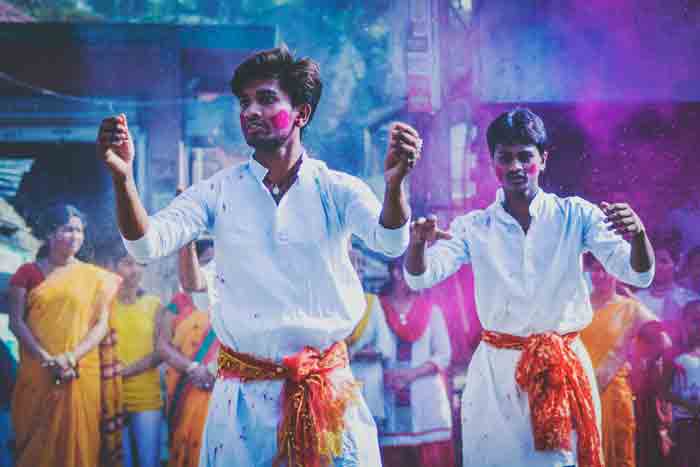IELTS Speaking Part 2: IELTS Cue Card
Describe a tradition in your country.
You should say
What is it?
Who takes part in it?
What activities there are?
And explain how you feel about it?
Note: You will have to talk about the topic for one to two minutes. You have one minute to think about what you are going to say. You can make some notes to help you if you wish.
Model Answers and follow up questions to describe a tradition in your country IELTS cue card:
Model Answer 1:
Introduction
Well, there are many traditional values in my country, and these are observed to preserve the local culture. However, there are many traditions that people follow.
What is it?
I would like to talk about the tradition of touching the feet of elders for a blessing.
Who takes part in it? and What activities there are?
This tradition is in practice since times Immemorial. It originated in Gurukuls, where students used to touch their guru’s feet to take their blessings. Later it became a common practice to touch the feet of elders or seniors for blessings.
And explain how you feel about it?
This is something every parent teaches to the children to learn the importance of giving respect to seniors and keeping this tradition alive. For example, I start my every morning by touching my father’s feet and my grandfather, and their blessings keep me in high spirits all day long.
Conclusion
Unfortunately, these days many modern parents are not giving this value to their young ones because of which they are getting detached from local traditions and cultures, and it can be a huge loss to the nation if this practice becomes obsolete. Therefore, it is important to put every effort to keep the rituals and traditions alive forever.
Model Answer 2:
Introduction:
Well, India has a rich culture that has become our identity. Be it in religion, art, intellectual achievements, or performing arts, it has made us a colorful, rich, and diverse nation.
India has a large number of festivals mainly because of the prevalence of diverse religions and groups.
Here the Muslims celebrate Eid, Sikhs have Baisakhi and birthdays of gurus, Hindus have Diwali, holi, and quite honestly, the number is endless.
What is it? and Who takes part in it? and What activities there are?
However, one thing that I would love to share is the culture of welcoming the guest, which is common in all of them. The guest in India is considered equivalent to god.
Every Indian culture is a way through which we behave with others, how softly we react to different things, our understanding of ethical values and beliefs. People from the older generation pass their beliefs and cultures to the upcoming generation.
Explain how you feel about it?
Thus every child that behaves well with others has already learned about their tradition from grandparents and parents. This is the major reason that we have a famous saying like Atithi Devo Bhava’.
Conclusion:
So, the basic roots in our tradition are spiritual practice and humanity.
Model Answer 3:
Introduction
- There are many traditions in India.
- But today I would like to talk about a tradition which is quite popular, especially in North India.
What is it?
- The tradition is called ‘karvachauth’.
Who takes part in it?
- It is actually a tradition in which women keep a fast from sunrise to moonrise for the safety and longevity of their husbands.
- It is celebrated on a special day based on the Hindu Lunar Calendar.
What activities there are?
- It is mainly a Hindu tradition, but some women from Sikh religion also celebrate it.
- Its origin is based on military campaigns of the past.
- The men would go to wars, and women would keep a fast for their safe return.
- In today’s time, it is seen as a symbol of love and affection between a husband and wife.
- In fact, nowadays even men keep a fast along with women to support them.
- Women begin preparing for Karva Chauth a few days in advance, by buying adornments jewelry, and other prayer items.
- On the day of Karva Chauth, women dress up, and at night they do a small prayer along with husbands with the moon in the backdrop.
- After this, they break their fast.
And explain how you feel about it?
- Earlier, I saw this tradition as a symbol of patriarchy in some sense, where only women are meant to keep a fast.
- But now I see it more as a symbol of love and sacrifice .
Conclusion
- I think as long as there is no compulsion on women to do this and they do this on their own, I find nothing wrong with it.
IELTS Speaking Part 3 : Follow up Questions
Here some examples of follow up questions that you may asked during your speaking part 3 by examiner related to cue card “describe a tradition in your country”.
1. What is the importance of traditional festivals?
Traditional festivals are significant because it brings family and friends together. Moreover, people forget all their tensions and feel very happy and relaxed while celebrating festivals.
2. What’s the difference between festivals now and in the past?
I think now people forget the history of festivals, which means there is a story or a historical fact behind the festival. People are celebrating festivals for enjoyment. However, if we talk about the past, people, even every child was known the meaning and story/reasons for the celebrations.
3. Do you think western festivals like Christmas are replacing traditional festivals in your country?
Well, people are indeed adopting western culture, and they are celebrating festivals like Christmas with their friends and families. But it does not mean people do not celebrate their traditional festivals. They celebrate both types of festivals with the same energy.
4. Do you think it is wrong for children not to celebrate traditional festivals?
I believe that festivals spread happiness. However, today’s generation shows less interest in traditional festivals, and it is because of the busy routine and technology. They are busy on their mobile phone instead of spending time with family and friends and celebrating festivals.
5. Do you think teenagers should learn about traditions?
Yes. they should know about traditions because traditions are our roots, and it is good and very beneficial if they are staying in contact with their roots.
Some cue-cards you may like :
- Describe something or someone that made a lot of noise
- Describe a water sport you would like to try in the future
- Describe a time when you were surprised to meet a friend
- Describe a time you saw children behave badly in public
- Describe a line that you remember from a poem or song
Credits :
Image : Photo by Debashis RC Biswas on Unsplash
Describe a tradition in your country IELTS cue card

Introduction
Well, there are many traditional values in my country, and these are observed to preserve the local culture. However, there are many traditions that people follow.
What is it?
I would like to talk about the tradition of touching the feet of elders for a blessing.
Who takes part in it? and What activities there are?
This tradition is in practice since times Immemorial. It originated in Gurukuls, where students used to touch their guru’s feet to take their blessings. Later it became a common practice to touch the feet of elders or seniors for blessings.
And explain how you feel about it?
This is something every parent teaches to the children to learn the importance of giving respect to seniors and keeping this tradition alive. For example, I start my every morning by touching my father’s feet and my grandfather, and their blessings keep me in high spirits all day long.







Excellent vocabulary
this cue card very helpful in my speaking
Cue card was very helpful. ☺